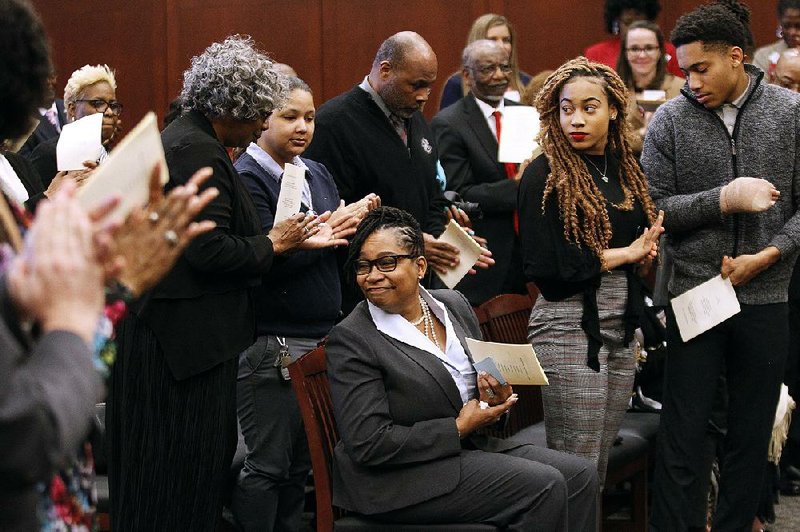Lisa Peters, who is only the second person to serve as the federal public defender in the Eastern District of Arkansas, said Friday during her formal swearing-in ceremony that she wants the office to become "more proactive" in the community.
"We're locking up too many people. There's got to be a better way of doing things," said the woman who, since mid-November, has occupied the top job in the same office where she worked under the former chief public defender, Jenniffer Horan, since the office opened in 1995.
Peters was named to the post by a committee of the 8th U.S. Circuit Court of Appeals in St. Louis, in conjunction with Eastern District judges, after Horan retired in November.
At her official investiture Friday afternoon in the federal courthouse in downtown Little Rock, three bench rows of Peters' family members from across the country joined the usual crowd of state and federal judges, defense attorneys, prosecutors and local dignitaries, such as Little Rock Mayor Frank Scott Jr., in wishing her well in her four-year renewable term.
She was surrounded by her three children -- Evan, Wesley and Morgan -- as she took the oath of office from Lavenski Smith of Little Rock, chief judge of the 8th Circuit.
Earlier, Smith had opened the ceremony from a platform shared with nine other black-robed judges by discussing the "vital role of the federal public defender's office," which provides legal representation to people charged with federal crimes who cannot afford to hire an attorney. Smith described how the Sixth Amendment right of the accused to effective assistance of counsel has strengthened over the years, eventually leading to the creation of the federal public defender services system. He noted that there are now full-time federal public defenders in 91 of the country's 94 federal districts.
Smith, and later Peters, thanked Horan, who wasn't present, for her years of service to the office.
Peters remembered that when she was interviewed in 1995 for one of the assistant positions, she was seven months pregnant and didn't think she would be hired. She said she was grateful for the freedom she had on the job to try cases and represent clients while also raising her family, noting that having time for family often comes last at private law firms.
LaTrece Gray, one of 12 assistant federal public defenders and 20 support staff members whom Peters supervisors, said Peters is someone who has taken care of people "without fanfare" for years. Gray offered examples that included leading a drive to collect Angel Tree donations at Christmas and then personally delivering the gifts to the families; giving clients rides to court or rehabilitation appointments; and always providing a "listening ear" for colleagues with gripes.
Peters generated a round of applause for her mother, whom she called "a strong leader of her family." She said that her father died when she was 16 and her mother raised the family by working at the Timex factory until losing her job the same year Peters graduated from high school. She said she didn't know how she was going to go to college, but she attended Fisk University in Nashville, Tenn., with reliance on God, $300 from her mother and a ride to the dorm from a neighbor.
"My passion has always been to serve those less fortunate," Peters told the crowd. "I hope to carry that passion to a higher level. People have a right to effective assistance of counsel, not just counsel."
"We as a team want to go out in the community ... and teach youngsters what could happen if certain steps were taken by them," she said, noting that she has also discussed ideas with the U.S. Attorney's office, which also "wants to work for the good of the community."
"It breaks my heart when I see young black men being brought to court daily," Peters said. "I believe it is our job to make sure they still have hope, and to give them a better way of seeing things. While I'm here in this position, I want to at least have a voice to help others. ... We are a community, and we are a family. ... Everyone who comes before us should be treated with courtesy and respect, and get the quality of representation that they deserve."
Metro on 03/16/2019
